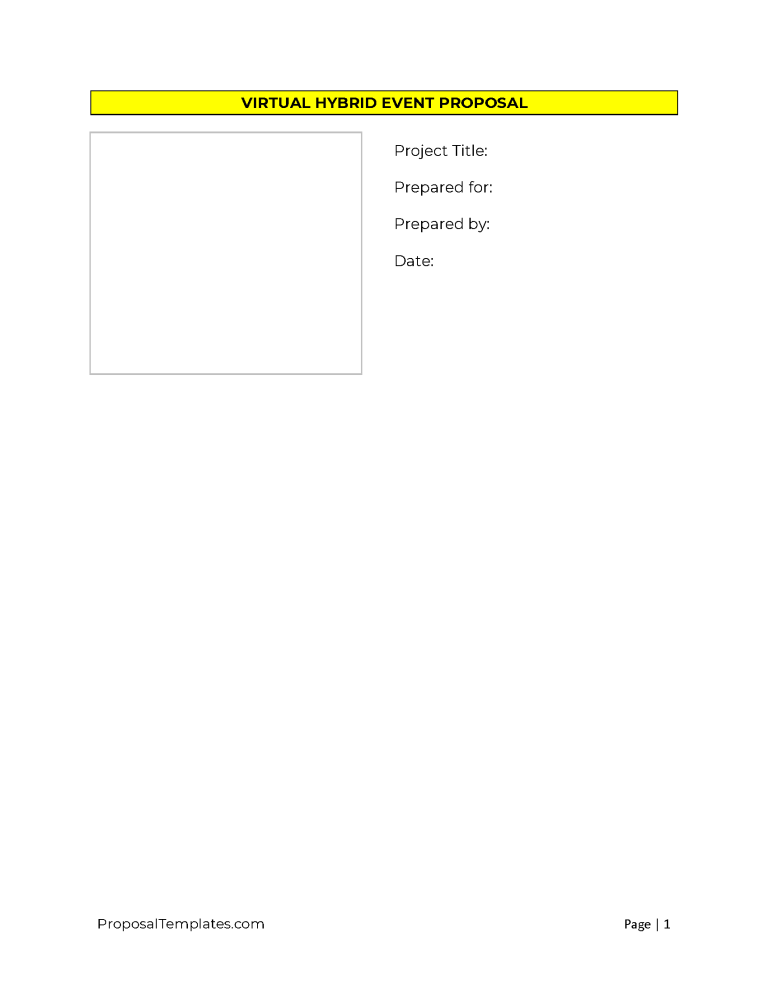Virtual hybrid proposals enable event managers and other stakeholders to set up an event that is either purely virtual or integrated with live components. Therefore, these proposals must focus on the technology used for the event, past platform successes, and applicable live venue details.
Types Of Virtual Hybrid Event Proposals (14)
- Hybrid Academic Conference – This proposal is used whenever an educational institute hosts an event with online functions.
- Hybrid Celebration – Proposals presenting the memorable experiences created by celebratory events (i.e., weddings) allowing online attendees.
- Hybrid Conference – This proposal promotes conferences attended physically or virtually, thus presenting the technical infrastructure, engagement, and attractions.
- Hybrid Fundraising Event – A proposal delivering specific in-person and online strategies for donor engagement for nonprofit events.
- Hybrid Gala/Awards Ceremony – Proposals presenting an award event’s audience engagement functions (i.e., voting) physically and online.
- Hybrid Marketing Event – Proposals featuring the physical and virtual marketing campaigns, initiatives, and promotions employed to promote events.
- Hybrid Networking Event – A proposal featuring events delivering physical and online networking opportunities therefore detailing interaction environments.
- Hybrid Music/Arts Festival – Proposals describing a festival event’s infrastructure so attending and virtual audience members may participate.
- Hybrid Sports Event – A proposal for sports event attendees may occur virtually and live (i.e., live streams, social media, engaging apps).
- Hybrid Team Building – This proposal features the goal-centered activities for a corporate event’s live and remote team members accordingly.
- Hybrid Trade Mission – Proposals discussing events where multi-regional and international businesses meet, thus outlining the advantage of virtual meeting options.
- Hybrid Trade Show – Proposals detailing a trade show’s virtual booths and physical spaces together with its engagement and marketing strategies.
- Hybrid Workshop – Proposals discussing the specifics (i.e., locations, online participation) of a workshop event with online support or classes.
- Virtual Seminar – A proposal made to pitch online educational events (i.e., webinars) and often focus on the event’s topics and speakers.
1. Virtual Hybrid Event Proposal Cover Page
Make a cover page for the proposal that clearly names the event as well as its dates, location, and website. Additionally, present any slogans, taglines, and the event logo.
- Hybrid Event Name, Dates, Locations
- Website, Social Media Links
- Slogans, Graphic Elements
- Legal Statements, Legal Information
- Event Organizer’s Contact Information, Logo
2. Title Page For Virtual Hybrid Event Proposal
Expand upon the cover page’s information with more detailed information regarding the organizer and other stakeholders. For example, present the organizer’s contact information as well as the details identifying this proposal.
- Hybrid Event Title, Proposal Title
- Proposal Preparer, Submission Date
- Organizer Information, Logo, Slogans
- Recipient’s Name, Address, Phone, Logo
- Table Of Content, Event Details, Website
3. Executive Summary
Summarize the main points and key features presented in this proposal but make sure it remains concise and compelling. Interest the recipient by specifically centering on topics they would be interested in.
- Event Objective, Call To Action (CTA)
- Benefits (Brand Visibility, Knowledge Sharing)
- Event Description, Format (In-Person, Hybrid, Virtual)
- Key Features (Performers, Entertainers, Speakers)
- Audience, Demographics, Expectations, Budget Summary
4. Virtual Hybrid Event Overview
Define the event objectives and specifically relate these to the proposal recipient’s interests. Also, describe the overall format of the hybrid event, including the strategies that will be implemented for virtual audience engagement.
- Event Name and Type, Event Objectives
- Event Theme, Purpose, Format, Sponsorship Opportunities
- Agenda, Event Duration, Dates, Registration
- Audience, Location, Technological Infrastructure
- Budget, Call to Action, Budget, Event Team, Event Policies
5. Audience Demographic Profile
Gather the demographics of the target audience projected live attendees, as well as online visitors, into a comprehensive report. Present the proposal’s recipient with audience descriptions such as location, economic status, professions, and education.
- Demographics, Psychographics
- Job Titles, Roles, Industry, Niche, Attendance Numbers
- Challenges, Pain Points, Goals, Objectives
- Technology Proficiency, Preferred Channels
- Past Event Experience, Motivations for Attendance
6. Virtual Hybrid Event Format
Further discuss the format of the event, such as the activities, attractions, workshops, speakers, and entertainment. Also, explain the integration strategy for the virtual and physical event activities.
- Dates, Times, Location, Theme
- Audience, Projected Attendees
- Exhibitor Booth Information, Costs
- Budget, Trade Show Reputation, Success
- Collaborations
7. Virtual Platform And Technology
Discuss the virtual platform chosen for this event in detail. Furthermore, build the recipient’s confidence in its functionality by explaining exactly why it will enhance the experience.
- Virtual Platform, Platform Features, Streaming Capabilities
- Accessibility, Technical Requirements, Support, Networking
- Content Delivery, Registration, Engagement Strategies
- Testing, Scalability, Recording, On-Demand Content
- Partnerships, Support Team, Data Privacy, Interactive Q&A
8. Virtual Hybrid Event Physical Venue
Provide a description of the physical event venue as well as the virtual user environment. To clarify, deliver the schematics for the floor plan of the physical venue as well as the site (or app) structure for its virtual componentst.
- Venue Name, Description, Location, Size, Security Measures
- Location, Accessibility, Layout, Session Management
- Capacity, Seating Arrangements, Health/Safety Measures
- Registration and Check-in, Audiovisual Equipment
- Catering, Networking, Exhibitor Areas, Venue Partners
9. Hybrid Event Setup
Specifically, define the strategy that will integrate the virtual and physical event components into a cohesive and engaging experience. This section is especially important for events where attendees can interact with the event in both ways.
- Hybrid Event Configuration, Venue Setup, Data Privacy
- Virtual Component Integration, A/V Equipment
- Technical Support Team, Hybrid Event Control Center
- On-Site and Virtual Interaction, Scalability, Redundancy
- Security, Integration (Sponsorships, Exhibitors)
10. Presenter Or Performers
Present the event’s roster of performers or presenters, such as the speakers of a conference or the names of concert performers. Accompany each one’s roster placement with their bios, qualifications, and other relevant facts.
- Keynote Speakers, Presenters, Panelists, Compensation
- Performers/Entertainers, Session Descriptions, Preparation
- Session Format, Relevance, Presentation Style, Rehearsals
- Technical Requirements, Previous Engagements
- Diversity, Inclusivity, Interaction, Support Team
11. Agenda And Schedule
Divulge the event’s program together with its calendar. For instance, define the milestones in setting up the event’s hardware and software infrastructure.
- Event Dates, Duration, Welcome Session, Scheduling
- Keynote Addresses, Breakout Sessions, Panels, Breaks
- Session times, Audience Interaction, Virtual Networking
- Networking Opportunities, Lunch, Meal Breaks, Themes
- Stakeholder Sessions, Entertainment, Interactive Agendas
12. Sponsorship Opportunities
Since many hybrid events attract sponsors, devote a section to explaining the sponsorship packages available. Thus, present benefits such as increased brand visibility along with the obligations that sponsors must live up to for each tier.
- Sponsorship Packages, Visibility, Brand Exposure
- Promotional Materials, Website, Signage, Success Stories
- Virtual Exhibit, Booth, Marketing, Contact Information
- Speaking Opportunities, Sponsorship Agreement
- Lead Generation, Return On Investment (ROI)
13. Registration And Ticketing
Detail the registration process for the hybrid event especially if it differs between the live and virtual attendees. Additionally, spell out the ticketing process from the purchase to admittance.
- Ticketing Platforms, Access Passes, Confirmation
- Session Selection, Session Tracks, Data Protection
- Cancellation/Refund Policy, Technical Support
- Exhibitor/Sponsor Registration, Post-Registration
- Group Registrations, Data Privacy, Contact Information
14. Promotion And Marketing Strategies
Comprehensively report on the marketing techniques set to attract attendees since a successful strategy often translates into a successful event. For instance, detail the content and schedule of the pre-event email campaign meant to turn a target audience into event attendees.
- Marketing Objectives, Target Demographics
- Online Advertising, Online Marketing, Content Marketing
- Search Engine Optimization (SEO), Public Relations
- Email Marketing, Social Media, Attendee Engagement
- Metrics, Reporting, Budgeting, Timeline, Analytics
15. Financial Disclosures And Obligations
Continue this proposal with a transparent discussion explicitly detailing the event’s projected expenses, funding, and projected revenue. If appropriate, detail the proposal recipient’s financial obligations as well as any applicable deadlines.
- Overview, Income Projections, Sponsorship/Exhibitor Fees
- Cost Breakdown, Personnel Costs, Promotion, Talent Fees
- Technology, Equipment, Infrastructure, Licensing
- Venue Expenses, Production Costs, Contingency Funds
- Emergency Expenses, Licensing, Attendee Revenue
16. Risk Management
Present the potential risks to event success but also lay out the contingency plans to handle them. It is important the client is aware of the risks and sees the effectiveness of the organizer’s mitigation strategies.
- Potential Risks, Risk Identification, Risk Assessment
- Legal Compliance Risks, Risk Reduction Techniques
- Crisis Management, Attentee Support, Copyright Issues
- Data Protection Regulations, Revenue Shortfalls
- Budgetary Overruns, Contingency Funds, Technical Risks
17. Evaluation And Measurement
Inform the recipient of the tools and strategies engaged to assess the hybrid virtual event’s success. In other words, go into how event KPIs (Key Performance Indicators) will be obtained and used to show event impacts.
- Key Performance Indicators (KPIs), Engagement Rates
- Metrics, Q&A Engagments, Website Analytics, Feedback
- ROI Measurements, Session Evaluations, Revenue Targets
- Technical Platform Assessment, Data Interpretation
- SWOT Analysis, Benchmarking, User Friendliness
18. Terms And Conditions
Describe any paperwork making legal obligations or statements to anyone involved with the event (i.e., software technicians, vendors). Furthermore, dispense a sample or official version of each in the appendices that follow.
- Event Rules/Regulations, Registration Requirements
- Intellectual Property, Copyright, Privacy, Data Protection
- Code Of Conduct, Legal Jurisdiction, Term Modifications
- Disclaimers, Cancellations, Refund Policy, Resolutions
- Force Majeure, Liability, Contracts, Contact Information
19. Appendices
As mentioned, reserve the appendices section for any attachments or required paperwork, such as legal documents. Gather all such documents together with supporting media (i.e., calendars) so that the proposal above can be reviewed without interruption.
- Organizer Contact Information, Sponsorship Packages
- Event Brochures, Venue Maps, Sample Agreements
- Budget Spreadsheets, Testimonials, Media Clippings
- Supporting Literature, Analytic Charts, Financial Charts
- Supporting Media (i.e. Posters), Insurance Policies

